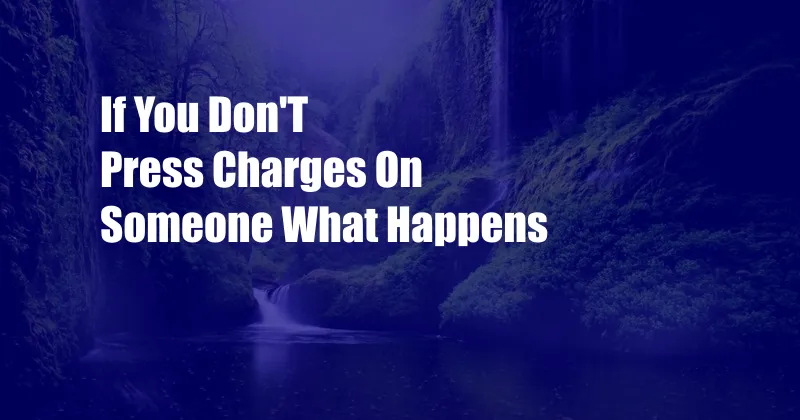
If You Don’t Press Charges, What Happens?
Have you ever been the victim of a crime, but decided not to press charges? Maybe you were afraid of retaliation, or you felt sorry for the person who hurt you. Whatever the reason, you may be wondering what happens when you don’t press charges.
In general, when you don’t press charges, the police will investigate the crime and decide whether or not to pursue it on their own. If the police believe that there is enough evidence to convict the suspect, they may issue a warrant for their arrest. However, if the police do not believe that there is enough evidence, or if you are unwilling to cooperate with the investigation, the case may be dropped.
What Factors Influence the Police Decision?
The police will consider a number of factors when deciding whether or not to press charges, including:
- The severity of the crime
- The amount of evidence
- The willingness of the victim to cooperate
- The suspect’s criminal history
- The public interest
In some cases, the police may be required to press charges, even if the victim does not want to. This is typically the case for serious crimes, such as murder, rape, or child abuse.
What Happens if the Police Don’t Press Charges?
If the police do not press charges, the suspect will not be arrested or prosecuted. However, the victim may still be able to file a civil lawsuit against the suspect. A civil lawsuit can result in the suspect being ordered to pay damages to the victim.
It is important to note that even if you do not press charges, the police may still investigate the crime. This is because the police have a duty to protect the public and investigate all crimes.
What Are the Benefits of Pressing Charges?
There are a number of benefits to pressing charges against someone who has hurt you. These benefits include:
- It helps to hold the suspect accountable for their actions.
- It can help to prevent the suspect from hurting others in the future.
- It can give you a sense of justice and closure.
Of course, there are also some risks associated with pressing charges. These risks include:
- The suspect may retaliate against you.
- The trial process can be stressful and time-consuming.
- You may not get the outcome that you want.
Ultimately, the decision of whether or not to press charges is a personal one. There is no right or wrong answer. You should weigh the benefits and risks carefully before making a decision.
Expert Advice
If you are the victim of a crime, it is important to seek help from the police. The police can investigate the crime and help you to decide whether or not to press charges. You can also seek support from a victim’s advocate. A victim’s advocate can provide you with emotional support and guidance throughout the process.
Here are some additional tips for victims of crime:
- Document the crime as much as possible. This includes taking photos of your injuries, writing down what happened, and getting the names and contact information of any witnesses.
- Report the crime to the police as soon as possible.
- Cooperate with the police investigation.
- Seek medical attention if you have been injured.
- Seek support from a victim’s advocate.
FAQ
What if I don’t want to press charges but the police do?
If you do not want to press charges, you can tell the police. However, the police may still decide to press charges on their own, especially if the crime is serious.
Can I press charges after the statute of limitations has expired?
No, you cannot press charges after the statute of limitations has expired. The statute of limitations is the amount of time that you have to file a lawsuit or press charges. The statute of limitations varies depending on the crime.
What happens if I press charges and then change my mind?
If you press charges and then change your mind, you can ask the prosecutor to drop the charges. However, the prosecutor is not obligated to drop the charges.
Conclusion
Deciding whether or not to press charges is a difficult decision. There are a number of factors to consider, including the severity of the crime, the amount of evidence, and your own personal safety. If you are the victim of a crime, it is important to seek help from the police and a victim’s advocate. They can help you to understand your options and make the best decision for yourself.
Are you interested in learning more about the topic of pressing charges?